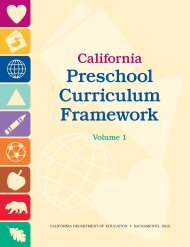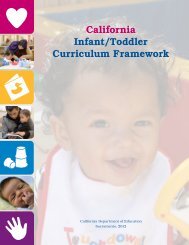California Preschool Learning Foundations - ECEZero2Three ...
California Preschool Learning Foundations - ECEZero2Three ...
California Preschool Learning Foundations - ECEZero2Three ...
You also want an ePaper? Increase the reach of your titles
YUMPU automatically turns print PDFs into web optimized ePapers that Google loves.
SOCIAL-EMOTIONAL DEVELOPMENT<br />
30<br />
ment”—has emerged. It emphasizes<br />
that in addition to responding to the<br />
incentives and punishments of adults,<br />
young children are motivated to cooperate<br />
by their emotional attachments<br />
to those adults and their desire to<br />
maintain positive relationships with<br />
them. Children cooperate in order to<br />
maintain relationships of mutual cooperation<br />
with the adults who care for<br />
them. Furthermore, young children are<br />
also motivated by the feelings of others<br />
to act in ways that do not cause others<br />
distress. Moreover, as they reach the<br />
end of the preschool years, children<br />
are also motivated to cooperate and act<br />
responsibly because in doing so, they<br />
think more approvingly of themselves.<br />
This reflects that young children have<br />
proceeded from a primarily “external”<br />
view of adults’ expectations and standards—in<br />
other words, cooperating<br />
because this is what adults expect—to<br />
an “internalized” acceptance of adult<br />
standards as their goal. The desire to<br />
perceive themselves as cooperative,<br />
helpful, and “good” emerges at this<br />
time and will remain an important,<br />
lifelong motivator of moral conduct.<br />
These conclusions about the development<br />
of cooperation and responsibility<br />
emerge from a large body of<br />
research literature, to which Kochanska<br />
has made major contributions<br />
(e.g., see Kochanska 1997, 2002;<br />
Kochanska and Thompson 1997). A<br />
review of this research literature can<br />
be found in Thompson, Meyer, and<br />
McGinley (2006). The development of<br />
capacities for cooperation and responsibility<br />
is important to early school<br />
success. A number of research teams<br />
have found that individual differences<br />
in children’s cooperation capacities<br />
are directly associated with children’s<br />
academic achievement in the early<br />
primary grades (Alexander, Entwisle,<br />
and Dauber 1993; McClelland, Morrison,<br />
and Holmes 2000; Yen, Konold,<br />
and McDermott 2004). Children who<br />
show greater cooperative compliance<br />
with their teachers are capable of getting<br />
along better in the classroom and<br />
achieve more than do children who are<br />
less cooperative.<br />
During the past several decades,<br />
however, a new view of the early<br />
growth of cooperation and<br />
responsibility—studied under the term<br />
“conscience development”—<br />
has emerged.<br />
Developmental changes in children’s<br />
motivated cooperation and their growing<br />
sense of responsibility build on<br />
developmental accomplishments in<br />
other social and emotional areas. In<br />
particular, these changes build on<br />
children’s developing capacities for<br />
self-regulation and changes in selfawareness<br />
that enable older preschoolers<br />
to perceive themselves as positive<br />
and approvable. In this respect, as in<br />
others, growth in the later preschool<br />
period is integrated and consistent<br />
across different areas of development.<br />
Relationships<br />
Attachments to Parents<br />
One of the central conclusions of<br />
developmental research is the extent<br />
to which young children rely on their<br />
close relationships with caregivers for<br />
emotional security and well-being.<br />
Decades of research on parent-child<br />
attachment relationships in infancy<br />
and early childhood have established<br />
the importance of the security of these<br />
relationships and their long-term<br />
<strong>Preschool</strong> <strong>Learning</strong> <strong>Foundations</strong>, Volume 1 • <strong>California</strong> Department of Education
















